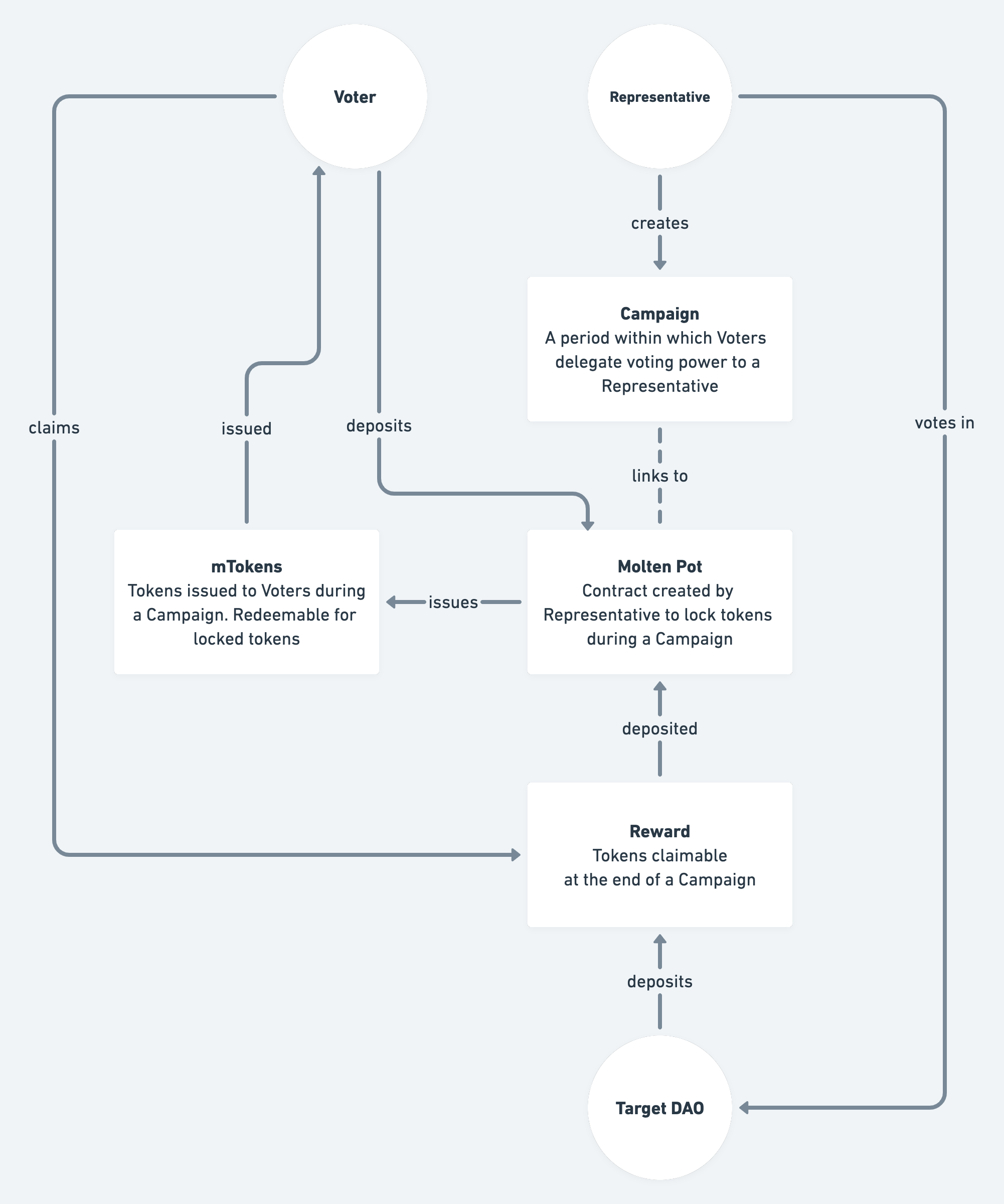🌋 Molten
Molten is WIP. This document will be updated as we conduct ongoing research and development.
Molten incentivizes voters to pool their votes to deter opportunistic behavior by large token holders.
Actors
Molten coordinates the actions of three actors:
Representative. Stakeholder that wants to accrue voting power but needs more resources. Equivalent to a delegate in a DAO with vote delegation.
Voter. Stakeholder that wants protection against large voters and has adequate resources.
Target DAO. DAO that wants to allocate resources in pursuit of its objective.
Components
Molten's components include:
Campaigns. A period within which Voters pool their tokens in order to delegate voting power to a Representative. Can be launched by the Representative once deposits exceed the Campaign threshold, e.g., 100,000 governance tokens deposited.
Campaign Manager. Contract that manages all Campaigns, including types, parameters, and rewards.
Molten Pot. Contract created by Representatives to lock tokens during a Campaign. Voters deposit and claim tokens from Pots. Launching the Campaign freezes deposits.
Molten Pot Factory. Contract used to create Pots.
Reward. Fixed token reward, e.g., 30,000 DAI, claimable in proportion to Voters' Pot claim at the end of a Campaign.
mTokens. Tokens issued to Voters during a Campaign. Each token represents a proportional claim on the underlying governance tokens and rewards locked in the Pot contract.
Operation

Butter uses the Campaign Manager to create a new Campaign Type and sets Campaign duration, Target DAO Governance Token (ERC20)
Representatives create Campaigns and broadcast their Campaign and Molten Pot contract address to Voters
Voters deposit tokens into Molten Pots attached to Representatives they believe will pool the most voting power for a Campaign
Target DAO deposits Reward in the Campaign Manager for the respective Campaign Type and sets Campaign threshold
Once a Molten Pot attached to a Representative exceeds the Campaign threshold, the Representative can launch the Campaign. Campaign launches end all other Campaigns of the same type, allowing Voters to claim tokens from the Molten Pots
At the Campaign launch, Molten Pots will delegate pooled governance token voting power to Representatives, e.g., AAVE, and issue mTokens to Voters, e.g., mAAVE
After a Campaign reaches duration, the underlying governance tokens and Rewards are claimable from the Molten Pot & Campaign Manager
During the Campaign, should mToken holders decide that a Representative is no longer protecting their interests, they can vote to terminate the Campaign, removing the Representative's voting power and forfeiting the Reward for all parties
Outcome
Molten combines peer incentives and market incentives. It uses peer incentives to incentivize Representatives to identify governance capture and corruption and increase stakeholder cooperation. It uses market incentives to surface and distribute voting power to the most competent and motivated Representatives capable of keeping the most influential voters in check.
Peer incentives will provide sufficient rewards to Representatives that identify corruption or capture2 in the form of delegated voting power to limit potential gains from either strategy, creating an effective deterrent.
Market incentives should encourage competent Representatives to emerge, able to monitor and counter opportunism by large voters.
Given the presence of both peer and market incentives, coordination costs are the most significant barrier to voters pursuing a collective voting strategy. We aim to prove the effectiveness of incentives on voter coordination.
Implementation
See prototype implementation here.